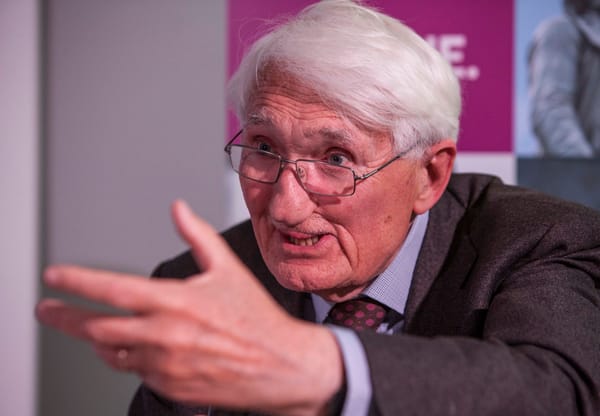We Have No Supreme Court
The philosophical incoherence of originalism prevents the Court from performing its core functions as a supreme court.

In 2023, Tennessee passed SB0001, banning minors from receiving gender-affirming care as treatment for gender dysphoria, including puberty blockers, hormone replacement therapy, and surgery. This law was challenged in court in United States v. Skrmetti, on the basis that it violated the Equal Protection Clause of the 14th Amendment. In particular, it was alleged that the law discriminated on the basis of sex.
Trans rights are sometimes derided as a "culture war" issue, a "distraction" from real material problems facing Americans. I think it is worth quoting at some length L.W., one of the trans kids affected by Tennessee's law, describing the experience of going through puberty without gender-confirming hormone therapy:
Obviously, you're not yourself. It's real-life body horror, essentially: Body horror is a genre of horror that's particularly terrifying because it's about the lack of autonomy over your own body.
As a trans person myself, L.W.'s characterization of the experience of gender dysphoria is accurate. Puberty in particular is a time when endogenous hormones will create marked and in many ways irreversible changes in your body. To know that your body is being warped, day by day, by these chemicals—to know that you are becoming, day by day, less yourself—is a horrific experience. Perhaps if you are cis you cannot relate. Imagine if a disease led your daughter's ovaries to cease producing estrogen and begin producing large quantities of testosterone. Imagine if, week after week, she began developing typically male features, like a man boiling up from under her skin. Imagine if the cure for this were cheap and safe and well known and denied to her by the state.
On June 18, the six Republicans on the Supreme Court ruled that Tennessee SB0001 did not violate the Constitution, and allowed the law to go into effect. I will quote their ruling at length:
Of course, a State may not circumvent the Equal Protection Clause by writing in abstract terms. See Personnel Administrator of Mass. v. Feeney, 442 U. S. 256, 274 (1979) (explaining that both overt and covert sex-based classifications are subject to heightened review). The antimiscegenation law that this Court struck down in Loving v. Virginia, 388 U. S. 1 (1967), would not have shed its race-based classification had it, for example, prohibited “any person from marrying an individual of a different race.” Such a law would still have turned on a race-based classification: It would have prohibited Mildred Jeter (a black woman) from marrying Richard Loving (a white man), while permitting a white woman to do so. The law, in other words, would still “proscribe generally accepted conduct if engaged in by members of different races.” Id., at 11.
Here, however, SB1 does not mask sex-based classifications. For reasons we have explained, the law does not prohibit conduct for one sex that it permits for the other. Under SB1, no minor may be administered puberty blockers or hormones to treat gender dysphoria, gender identity disorder, or gender incongruence; minors of any sex may be administered puberty blockers or hormones for other purposes.
As you can see, the Republicans were alive to the argument that SB0001 violated a previous Supreme Court ruling known as Bostock. Bostock was ruled concurrently with two closely related cases, Harris Funeral Homes and Altitude Express. Bostock concerned a gay man who was fired for wanting to start a gay softball team, Altitude Express a gay skydiving instructor fired for being gay, Harris Funeral Homes a trans woman fired for being trans.
Neil Gorsuch's reasoning, covering all three cases, was succinct:
Today, we must decide whether an employer can fire someone simply for being homosexual or transgender. The answer is clear. An employer who fires an individual for being homosexual or transgender fires that person for traits or actions it would not have questioned in members of a different sex. Sex plays a necessary and undisguisable role in the decision.
Of particular interest is the application to Harris Funeral Homes, in which the ruling held that Aimee Stephens (the trans woman in question) had been punished for behavior (wearing a dress, presenting as feminine, using the women's bathroom, etc.) that would have been accepted if she were natally female.
At first glance, this plainly entails that SB0001 is unconstitutional. A cis girl may take estradiol (as is sometimes necessary to correct various endocrine disorders); a trans girl may not. This seems to be straightforward discrimination on the basis of sex. The same medicines are allowed or prohibited depending on the birth sex of the individual.
The Republicans on the Court decided instead to redefine what "the same medicine" means. The cis girl is "taking estradiol to correct a nonstandard puberty." The trans girl is "taking estradiol to treat gender dysphoria." Every minor, of any sex, is forbidden from taking medicines to treat dysphoria. Presto: no discrimination.
In 1955, the philosopher Nelson Goodman defined a new color, "grue." An object is grue if it is observed before January 1, 2030 and is green, or else not observed before January 1 and is blue. Now ask: given an object that looks green (or grue) today, will it be "the same color" on January 1 as it was on December 31? This seems like a straightforward question. Goodman's point was that it is not: what counts as "the same" color depends on how exactly we choose our color concepts.
In other words, Goodman transformed an old problem in the philosophy of science, the riddle of induction, into a conceptual register. And like the riddle of induction, it cannot be solved in the abstract. How to "project" a finite series of observations—or a finite series of linguistic or conceptual practices—into the future does not have a single set answer.
This is precisely the problem at the heart of the Skrmetti ruling: what counts as "the same" conduct? The Republicans on the Court are of course "originalists," or "textualists," or whatever they call themselves these days. The correct concepts are defined by how the language of the Constitution was used at the time it was drafted and ratified. The "original public meaning" of the text is all that matters.
Originalism is often framed as if it were a legal doctrine, and objections to it often made on the basis of it being bad law or bad policy or otherwise morally objectionable. But in fact originalism is not a legal doctrine: it is a doctrine in the philosophy of language—a doctrine about the meaning of words.
The problem turns out to run quite deep. As Saul Kripke argued in 1980, there is a persistent fantasy that a finite set of linguistic practices of itself lays out "rails to infinity" which determine the application of that concept in all future and conceivable contexts. But this is a fantasy, as Goodman's argument shows. There are an infinite number of possible "tracks" that count as consistent extensions of current practices.
As Mark Wilson argues, the extension of our current linguistic practices to new terrain should be understood as a social process—not unlike the laying of tracks in untamed and unknown land—which is shaped by the purposes we need that language for, as well as the nature of the terrain we encounter. In many cases, we may even wind up with somewhat disjointed linguistic practices—what Wilson calls "theory facades." A paradigmatic example is hardness, which is a profoundly useful concept in engineering and design, even as "hardness" tracks wildly different microphysical properties across different ranges of the hardness scale and different materials.
To return to the law, and originalism: if you read all the diaries and all the letters and all the papers written by all the Reconstruction Congress—if you had, counterfactually, access to audio recordings of every word they ever uttered—that would not of itself determine whether a cis girl and a trans girl both taking estradiol 6mg daily was "the same" conduct. As Adam S. Rust put it in these pages half a decade ago, "Even with the most perfect knowledge the judge would be no closer to a correct interpretation." Justice Ketanji Brown Jackson herself has noted
Pure textualism is incessantly malleable—that’s its primary problem—and, indeed, it is certainly somehow always flexible enough to secure the majority’s desired outcome.
Originalism is not a bad legal doctrine. It is an incoherent one, a tissue of nothing. As with any incoherent doctrine, it allows you to prove anything. Thus in practice what it amounts to is a ritual invocation of the Founders, gesturing at this or that piece of text from a few centuries back, before delivering whatever conclusion was approved on Fox News the night before.
Robert Black has argued in these pages that the core role of the Court in our republic is as a forum in which different interpretations of the law and the Constitution may be publicly debated, such that the losers—and there will always be losers; as Black puts it, "we cannot wish away the problem of reasonable disagreement"—feel that their objections have been discussed in good faith.
The Court is not the final word—for in our democratic system, there can be no final word: the working-out of a government of the people is a neverending task for us, the people. But the role of the Court as that high and public forum of Constitutional interpretation remains essential. And for those of us to the left of Sean Hannity, we understand that we will never face an honest tribunal before the six Republicans on the Court.
But set this aside. Perhaps all this high language about Constitutional tribunals is overblown. From a boring, bureaucratic perspective, the key role of the Court is to resolve circuit splits—to settle a single interpretation of the Constitution that governs all lower courts, allowing individuals to conduct themselves with assurance as to what the law actually is.
The incoherence of originalism prevents the Court from performing even this duty—as Skrmetti shows. The Court has in practice introduced a split within its own jurisprudence. In any given case involving trans rights—or sexual discrimination more broadly, or equal protection more broadly—how is anyone to know what the Court's understanding of the law is? Because they are unwilling to articulate the real reasoning behind their rulings, their prior rulings provide little guidance as to future decisions.
To take just one recent example, how are we to tell whether a given federal appointee is protected from arbitrary removal by the President? He may remove a member of the National Labor Relations Board, because of the unitary executive; he may not remove the chairman of the Federal Reserve, because it is "uniquely structured" with a "distinct historical tradition." How are we meant to apply this "reasoning" to other cases? Of course, we all know the real answer: even the Republicans on the Court know better than to mess with the raptor fences. They regard the Federal Reserve's independence as immensely economically consequential, and the NLRB's less so. But they cannot say this aloud.
In the current system the parties at the Court can never talk honestly or directly about the principles at stake. No good faith discussion is possible under the current regime of relentless and partisan dishonesty; no clear and public principles can be known when the real mainsprings of Republican thought are cloaked in the pretext of originalism. Instead we have a game of endless Calvinball, in which new doctrines are invented whole cloth—the "major questions doctrine," the "qualified immunity doctrine," the "unitary executive doctrine"—in order to enable whatever the Republican cause du jour happens to be.
The "living Constitution" theory attracted a great deal of criticism for being non justiciable: it was too indeterminate, too subject to the whims and preferences of "activist judges," to form a firm basis of Constitutional interpretation. What originalism offers instead is—the same thing, but obscured under a heavy layer of mystification and lies. If the Republicans had honestly articulated their viewpoint that trans persons are second-class citizens, that at least would be the basis for public debate on who is included in the citizenry of our republic.
But an honest conversation about the purpose of our Constitution and its clauses, the social purposes it serves, and how we might serve or modify those purposes in new and unforeseen cases, is not possible as long as the Court is supermajority dominated by political apparatchiks who cannot even be honest about their politics.
A future Democratic administration must rectify the Court. A genuinely impartial Court seems too much to hope for. One can write a rule against chicanery and bad faith; in practice there is no way to enforce it. The deeper problem is that the link between the Court and the people has been broken—deliberately broken, over a period of decades, by Republican actions. Under the current system, appointments to the Court are both lifetime sinecures and intensely partisan affairs of tremendous national stakes.
Aside from impeaching those justices who have perjured themselves or otherwise violated their oaths, the best structural solution is to turn down the partisan temperature and bring the Court closer to the people. Regular terms of eighteen years, with no possibility of a second term, would allow for a steady cycle of retirements and appointments during each presidential administration. Expanding the Court to handle the large volume of cases an increasingly large country produces would also defuse the stakes of any given appointment, while allowing for more rapid turnover.
Until then, we have no Supreme Court. We have six Republicans in black robes, a second legislature with pretensions to grandeur, legislating from the bench without even doing us the courtesy of honesty in their malfeasance.
To return, at last, to Skrmetti: the question of whether equal protection allows trans kids to access the same hormones and prescriptions available to cis kids is, fundamentally, a question of who is allowed and enabled to participate in our republic. Who is an equal citizen—and who is separate "but equal."
But we cannot have this debate—we cannot even address these questions—under the current regime. It is in this sense that our republic currently lacks a Supreme Court. The Republicans on the Court have attracted much criticism from Democrats and progressives for their well-known corruption, perjury, and other impeachable offenses. The issue goes deeper. The philosophical incoherence of originalism prevents the Court from performing its core functions as a supreme court.
Featured image is "Judge John Marshall Harlan, Supreme Court" c. 1865-1880. Lightly edited.





